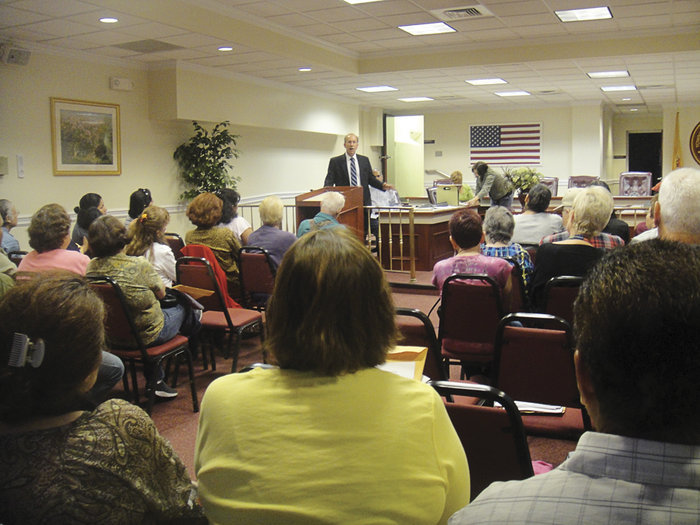Residents of Manhattan Trailer Court in North Bergen have rejected an offer from the property owner that would have divided $700,000 among them and required them to leave the property in April 2013 to make way for a new development.
At a special meeting in the council chambers of the municipal building recently, the residents, some voting by proxy, rejected the offer by three votes. That action started the clock ticking toward a deadline of Dec. 31, 2013, when all residents must move out.
Jeffrey Beides, attorney for the Manhattan Trailer Court’s Homeowner’s Association, called the offer “fair.” But after a grueling hour and a half of explanations and debate, the residents, who have been battling to stay in their homes for over three years, rejected the deal.
The history
The case began in June 2009, when Lynchen Wassil, an Englewood resident and widow of trailer court owner Julius Wassil, went to Bergen County Surrogate Court to settle the estate of her late husband for herself and his other relatives. The owner said she had a potential buyer who would like to convert the trailer park land into 216 residential units.
“What’s good for one person isn’t necessarily good for another person.” – Attorney Jeffrey Beides
____________
The property had climbed in value over the years, especially with a new NJ Transit light rail stop next door.
Show me the money
The recent meeting was run by Beides and Homeowner’s Association Committee Vice-President Maria Cortez, who has lived at the trailer park since 2000. Cortez translated the proceedings for the many Spanish speaking attendees.
“We’re here for one purpose,” said Beides, “and that is to vote on whether to accept the proposal to settle the litigation concerning the offer that the owner of the trailer park has made.”
Under that deal, $700,000 would be divided among the residents and they would agree to be gone by next April 1, 2013. In addition, litigation brought against the property owner by the residents would be dismissed. Another $100,000 would be paid by the property owner to settle Beides’s legal fees.
“We allege that they didn’t give us the opportunity to buy it and as a result we lost people,” said Beides. “We lost the financing and were damaged by their actions, and we should get a reduction in the price or a dollar amount awarded to us by the court.”
Since the legal battle began four years ago, the number of homeowners on the property is uncertain, but Beides’s letter states it is between 50 and 71. If 50 people were to split $700,000, they would receive $14,000 each.
“I don’t think anyone knows how many people are here,” said Beides.
If residents accepted the offer, they would have to produce a copy of their last lease from Dec. 2006 to 2007, along with two copies of the last rental payment. They would have to sign an agreement to be out of their homes by April 1, 2013.
At least two thirds of the residents needed to have an affirmative vote.
For those who were unable to attend the meeting, proxies were sent. Some votes were indicated in a letter to Beides. Those who did not attend or chose not to send Beides a proxy were considered a no vote.
“There’s no right or wrong answer,” said Beides. “What’s good for one person isn’t necessarily good for another person.”
He added, “They’re not making a very generous offer; they’re making a fair offer.”
Proper documents might be scarce
Many homeowners said they didn’t have a copy of their last lease and wanted instead to use the title or bill of sale for their trailer units. Another concern addressed by many homeowners was that some own more than one mobile home or were renting a home to others, which they admitted was a violation of their lease.
“Make educated votes,” said Jesus Valdes, who has been living in his mobile home since 1994.
Valdes was clearly upset that the majority of the votes were against the settlement.
Cortez said she voted no because she didn’t believe the offer was high enough for all the residents. Others felt they might be able to get more money from the property owner.
Beides’s letter states, “There is very little chance that we will be able to obtain an extension of the Dec. 31, 2013 date by which you must vacate the premises. In the event that the proposal is not accepted, you will each receive the five months’ ‘comparable housing’ rent concession, as well as a one month moving cost rent concession.”
Still, the letter said, “Dec. 31, 2013 is the last day that any of you will be legally entitled to remain in your homes.”
The final vote was 24 in favor of the settlement, 27 opposed. Cortes believed that many homeowners were missing from the meeting, although 51 people were present.
Vanessa Cruz can be reached at vcruz@hudsonreporter.com
